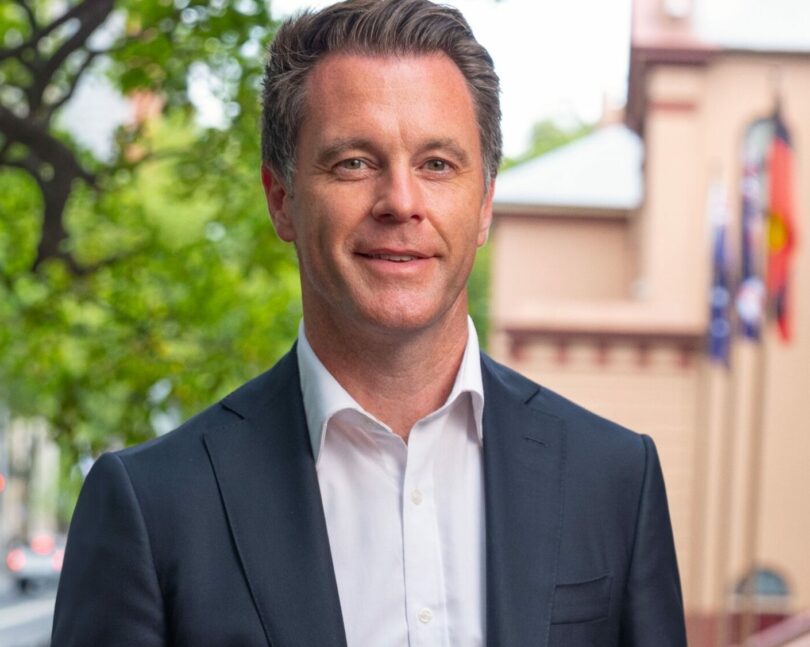PREMIERS ADDRESS TO THE NSW FARMERS’ ANNUAL CONFERENCE 2024
ROSEHILL GARDENS, JAMES ROUSE DRIVE, ROSEHILL
WEDNESDAY, 24 JULY 202
Thank you so much delegates, thanks Xavier for having me on the home of the Darug people.
And congratulations to you Xavier – on your unanimous re-election as President yesterday.
Congratulations, it’s fantastic to see.
Xavier has been a source of advice and wisdom for myself and many other ministers in the New South Wales Government – so I commend New South Wales Farmers’ choice.
Congratulations also to Annabel Johnson – for taking over the reigns as CEO this year.
And of course I’d like to acknowledge Minister Moriarty, as well as the leader of the National Party, Dugald Saunders, who’s with us this morning.
It’s great to see you all for a third time here at Rosehill.
Xavier promised a gentle time for me as Premier of New South Wales and then I found out that the conference was to be held at Rosehill racecourse.
I said, “mate any chance of changing the venue?” He said “absolutely not! It’s been booked in.”
But maybe you might have to look for somewhere next year, delegates.
Friends, it’s a great honour to be here and it’s important that we have this conference at this location because it does tell the story of modern agriculture in our country.
Rosehill is where the Macarthurs began their world changing experiments with Australian wool.
And across the road is James Ruse Drive – named after the first successful farmer in the colony of New South Wales.
James Ruse was a rare thing in the new colony: a convict with experience in agriculture.
Which is why he was recruited by Arthur Phillip to establish the state’s first crop out here near Parramatta.
He was pretty good at it – it turned him and his product into a hero in colonial New South Wales.
And put yourself in their shoes.
Far from home. Terrified of hunger.
Wondering whether their old seeds would take root in the new world.
Everything hinged on the success of those early experiments.
And when you look back at moments like that, you realise what an incredible achievement modern farming is.
Now we almost have the opposite problem.
You’ve been so successful that some people, if they’re not connected to the bush, can sometimes forget where their food comes from.
But you know better than me that our food doesn’t fall from the heavens.
When people toast their bread in the morning – that wheat came from a farm in Gilgandra.
When they barbecue a lamb chop for dinner – that meat was bred in Cowra.
When they add milk to their tea – it might have come from the New South Wales Northern Rivers or a dairy cow in Robertson.
And when they drink a glass of orange juice – those oranges were grown in Leeton.
For those of us in the city, we can never take that for granted.
Food security is so important for our economy and the nation’s future.
And as Premier of NSW, I promise I never will.
Farming is an absolute bedrock industry in New South Wales.
It feeds us. It employs hundreds of thousands of people.
It drives export income.
Last year, our farmers produced $21 billion of gross value.
Now that’s the second highest year on record – beaten only by the year prior to that.
In practice, that looks like:
10 million tonnes of wheat.
990 million litres of milk.
6 million head of beef cattle.
26 million head of shorn sheep – as the largest wool growing state in Australia.
You produced 60% of Australia’s oranges.
96% of our prunes.
86% of our blueberries.
By any measure – it is an economic powerhouse.
Whatever gets thrown at you – you keep on rolling.
In the last five years, you’ve been through fire and flood and a global pandemic.
But each time, every time, farmers in New South Wales have weathered the storm, and got back up again.
Now, farmers are proud people in New South Wales, with a strong and impressive lineage.
All else being equal, farmers in New South Wales are not putting their hands out for government help.
The reality is – there are certain problems that can only be solved collectively with the help of the state.
Problems that require cooperation between governments and people that live on the land.
Which is where we’re focussing the state government’s efforts – on those threats that a farmer shouldn’t have to deal with by themselves.
And at the top of that list is biosecurity.
This something we’ve heard from your leaders in the New South Wales Farmers for a long time and it needs to be an absolute priority.
Invasive species cost New South Wales around $2 billion per year in lost production.
As one of your chairs from Cooma has said:
Invasive species are like a ‘slow moving bushfire’.
When there is a bushfire, we all get out there to help.
We need to have the same attitude when it comes to weeds if we’re going to have any chance of getting them under control.
Now, Craig Mitchell is right – we all need to hold a hose here.
And that is why, as a government, we will be rolling out $946 million as part of a biosecurity package.
Almost a billion dollars – to identify, control and destroy the pests and weeds that are threatening business.
We’ve seen the importance of this funding when the incursion of fire ants came over the border from Queensland.
When these ants swarm, they chew up crops and ruin machinery; they attack livestock and damage local ecosystems.
We’ve even seen them travel along rivers – by turning themselves almost into floating rafts.
These ants are a menace, and we take them very seriously.
When we came to office, there was $15 million on the table to deal with the ants.
But as a result of the threat increasing, we’ve increased the response to $80 million – tipping in more than any other state into the national program.
Now there’s a team working on it to counter the threat. We’ve also got a team inside the New South Wales Government working on it full time.
Delegates, they will respond to any suspect reports immediately.
So far, they’ve received almost a thousand reports – with only three positive identifications.
They’ve checked vehicles crossing the border in the infected zones.
They’ve destroyed ants they found near Ballina.
They will continue to stay vigilant.
But like all biosecurity issues, we need to work together here – with government and industry working hand in hand.
Delegates, it’s the same approach needed as we deal with feral pig numbers – particularly after the recent wet seasons.
As Xavier has talked about only recently – with pigs weighing more than 100 kilos, some are rampaging through paddocks, trashing food crops and killing calves.
As he’s said – these pests are bigger than the farmers trying to control them.
As a Government, we need to have your back here.
Which is why we’re spending $13 million a year on the problem, the biggest feral pig program anywhere in the country.
So far, through baiting and trapping and shooting, we’ve taken out 110,000 pigs in a nine month period.
Now that’s above our original target of 87,000.
5,000 properties have taken part in the operation.
But it’s been a genuine partnership.
Now, there are still a lot of feral pigs left.
We’re currently targeting hot spots in the Riverina, the northwest, and western NSW.
But as the numbers show, we’re making progress.
And I’d like to applaud the leadership of our first Feral Pig Coordinator, Bec Gray, for all the great work done here.
Friends, we could keep listing problems – and we have no shortage of threats to this vital industry.
We’re also dealing with the Varroa Mite; and we’re also monitoring the Avian Flu situation of course very closely.
But one other example I wanted to note was our efforts to push back the Hudson Pear in western NSW.
If you’ve seen pictures – you’ll know how ugly these plants are.
As one farmer out west put it:
It’s a genuine concern … no shearer is going to want to bury their hand into the back of one of those things.
We’re currently using aerial inspections – to identify the outbreak.
And landholders can access chemicals and spraying for free if they find it on their property.
We’ve sprayed tens of thousands of hectares already – and will continue this fight in the coming years.
Now that’s the thing about biosecurity: you can’t drop your guard for a second.
You need to be alert and ready; and you need to coordinate your efforts, both with industry landholders, farmers and of course the government.
That’s why, at the election, we promised to introduce the state’s first ever Biosecurity Commissioner.
The role was developed following extensive consultation with farmers and land holders.
We wanted someone who could give independent and impartial advice, while also advocating on behalf of the industry.
A permanent independent Biosecurity Commissioner is now law in New South Wales.
Since last year, Dr Marion Healy has served as our interim commissioner.
Today – I’m delighted she has now officially been appointed to the role.
She has over twenty years experience across ag, biosecurity and food safety.
She’s been doing a great job delegates – so we’re very happy she’s staying on, fulfilling these important tasks.
I really do value these conversations and meetings with Xavier and Annabel and farmers across New South Wales.
As has been said many times, most often by the National Party, I was born and raised in Sydney.
But one of the great privileges of a job like this is that you do get around the state. To places that you might not otherwise have visited.
Meeting new people, getting to know new communities in parts of the world that I didn’t grow up.
Without this job – I probably wouldn’t have met rice farmers on the Murray; or fruit farmers in the Tweed; or cattle farmers in Gunnedah; or oyster farmers in Bateman’s Bay.
And it’s perhaps unlikely that I would have attended the Deni Ute Muster as well.
But I’ve learned a lot from these conversations. About the culture, the lifestyle, the threats, but also the massive opportunities and the sense of community in regional New South Wales.
I’d like to make it clear to all of you that we know that we can expect honest good faith criticism from New South Wales Farmers when the New South Wales Government gets it wrong.
We take the criticism seriously and we do not dismiss it out of hand.
We also know that we’ve got a massive obligation as the government to talk up the industry and put partisan politics to one side.
Life’s too short for endless political bickering, particularly when we’re so far away from the next election.
Delegates, we didn’t do it in opposition and we don’t want to do it in government either.
And I want to give you a commitment that both myself and my ministers will listen and we will learn as a government.
We hope to get better at on the ground changes that grow the economy, that respond proactively to the interests of the farming community in the state.
Not just on equity grounds, not just because it’s vital to our regional communities, but it is proving to be a necessary part of having a more complex, vibrant economy that is export led.
There is no strong New South Wales without a strong farming sector.
Thanks for having me this morning.
And thanks for everything you do for this great state, I appreciate it.






